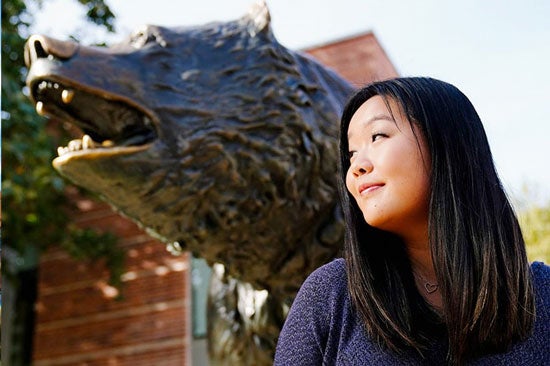
Classes and instruction
Approximately 80% of courses are being taught in person this fall. There are currently no caps on the number of students allowed in a classroom beyond normal room capacities, although some of our larger lecture courses are being conducted remotely (with their discussion sections being held primarily in person).
Our expectation is that every student will receive at least some in-person instruction.
Regardless of the size or location of the on-campus class, students are encouraged to remember these guidelines:
- Complete a daily symptom check. Instructors will have access to a clearance portal to ensure that students attending class each day have cleared the mandatory Symptom Monitoring Survey.
- Wear your mask. Face masks are required at all times during classroom instruction.
- Refrain from eating or drinking. Exceptions can be made for hydration or the medically necessary consumption of food or medications as appropriate.
If you have to miss class
With the return to in-person instruction, there is likely to be an uptick in students missing class due to isolation and quarantine protocols or because they haven’t been cleared by the Symptom Monitoring Survey.
The prospect of missing class time, projects or assessments can be daunting. Please know that your instructors are committed to accommodating students who cannot be in class for these reasons through video or audio streaming or recordings, makeup assignments and assessments, alternative projects or other means. Instructors have been informed that students’ absences due to isolation or quarantining or a failure to clear the daily symptom check should not factor into any attendance component of students’ final grade.
Students needing to isolate or quarantine are encouraged to notify their course instructors as soon as possible and explain their circumstances. If an instructor requires a medical note, students can visit the Arthur Ashe Student Health & Wellness Center’s patient portal, and select medical excuse option under “Messages.”
Students who are significantly sick with COVID-19 may qualify as being temporarily disabled and receive support from the Center for Accessible Education following an interactive process with the instructor.
Temporary remote instruction
While instructors cannot simply decide on their own to switch an entire course from in-person to remote instruction, they may teach up to two classes in a row to remotely without prior authorization if they are ill or experiencing symptoms of COVID-19, are temporarily isolating or quarantining, or are traveling for work or some other necessity.
Any shift that extends beyond two classes and lasts for up to two weeks would require the approval of the department chair and/or dean; a change of modality lasting longer then two weeks would require the final approval of UCLA COVID-19 Response and Recovery Task Force’s education working group.
It is also likely that, rather than shifting to remote instruction, a fellow faculty member, co-instructor or teaching assistant may lead one or more classes if the primary instructor is not available.
Pivoting to hybrid or remote instruction
Significant changes in the public health landscape could require UCLA to make changes to instruction during the fall quarter — including adjusting classroom density or enrollment limits or shifting to hybrid or completely remote instruction. Our COVID-19 Pivot Plan and Decision Matrix (PDF) describes the criteria that will inform possible changes in our operations.
Current remote courses
A small number of courses have been scheduled for fully remote instruction this fall, including those for which the instructor has a medical accommodation that does not allow them to teach in person and certain courses that, were they not offered remotely and were offered only in person, could impact a student’s progress toward their degree.
Courses scheduled for remote instruction for fall cannot be moved to in-person instruction.
Students

